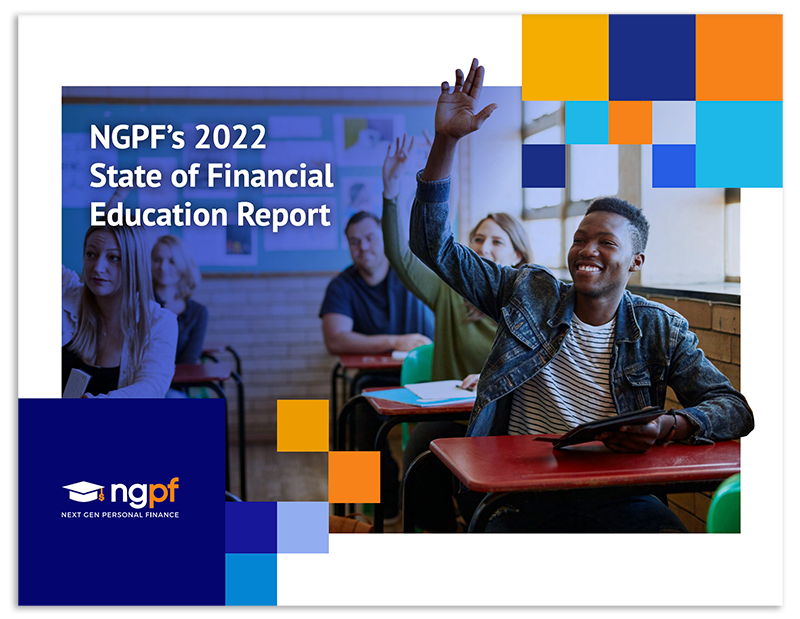Mission 2030: Financial Education for ALL
Why is the NGPF teacher community's goal that ALL students will take at least one semester course in personal finance before high school graduation by the year 2030?
Because school is where life-changing financial education can reach ALL young people, not just the lucky few.
SEE NEW RESEARCH SUPPORTING FINANCIAL EDUCATIONRobust studies show: guaranteed financial education improves lives forever
See what teachers and students are saying about the importance of personal finance education:

SMARTER SPENDING & BORROWING
Graduates of high schools with guaranteed financial education...
- are 21% less likely to carry a balance on a credit card while in college
- submit the FAFSA 3.5% more often, and
- use subsidized student loans 13% more often
...than their peers without guaranteed financial education, saving an average of $1,300 in high-interest private debt per student.1

ENDING CYCLES OF PREDATORY DEBT
Graduates of high schools with guaranteed financial education are less likely to fall prey to high-cost predatory loans (such as payday loans) than their peers without guaranteed financial education.2
Students and adults are calling for guaranteed financial education in schools
High school students and adults overwhelmingly rank personal finance as the most useful high school course.
76%
of recent high school grads said they wished their schools placed more emphasis on personal finance, according to a 2019 Experian Consumer Finance Survey.3
88%
of adults surveyed in April 2022 said they wanted all schools to require either a semester- or year-long personal finance course.4

Personal Finance has helped me realize I need to build generational wealth. It's not just about me becoming well-off, but also my kids and grandkids. That's what compounding and investing can do for my family.
Ja'Von
HIGH SCHOOL GRADUATE, CLASS OF 2020

Are you ready to take action?
NGPF has a step-by-step plan, proven in thousands of high schools, to help you expand financial education access in your community.
TAKE ME TO THE NEXT STEPAn investment in education with lifetime ROI
Free curriculum and free teacher PD have significantly reduced costs. Meanwhile, NGPF estimates the discounted value of a personal finance course at $60,000 per student in additional lifetime wealth, which results in a $36-to-$1 Return-On-Investment (ROI). Go behind the numbers here.

Financial Education has drastically changed my life. I feel so confident in the fact that I will become independent in the future. It's been such an empowering experience.
Lila
HIGH SCHOOL STUDENT, CLASS OF 2023
GOT FINANCE?
Thousands of high schools are already equipping their students with financial skills to thrive in the real world. Choose your state to find what personal finance courses your local high schools offer.
SEE MAPA CHILD'S ZIP CODE, RACE, OR FAMILY INCOME SHOULDN'T BE DESTINY
Montana State University & NGPF’s collaborative analysis of over 11,000 public high school course catalogs shows glaring gaps in financial education access by race, wealth, and locale. Share the 2022 State of Financial Education Annual Report with your local stakeholders today.
READ THE LATEST REPORT

 2021 Report
2021 Report
Read archived report >
 2020 Report
2020 Report
Read archived report >
 2019 Report
2019 Report
Read archived report >
 2018 Report
2018 Report
Read archived report >
I'm ready to take action!
You've seen why every student should take a personal finance course before graduation, and you're ready to expand access in your school or district.
TAKE ME TO THE NEXT STEP1 Stoddard, C. and Urban, C. (2018). The Effects of K-12 Financial Education Mandates on Student Postsecondary Education Outcomes.
2 Harvey, M. (2019) Impact of Financial Education Mandates on Younger Consumers’ Use of Alternative Financial Services. The Journal of Consumer Affairs.
3 Experian News & Research, 2019. Survey: Generation Z Keen on Learning About Personal Finance and Credit.
4 National Endowment for Financial Education (NEFE), 2022. Poll: Most Adults Support Financial Education Mandates.







